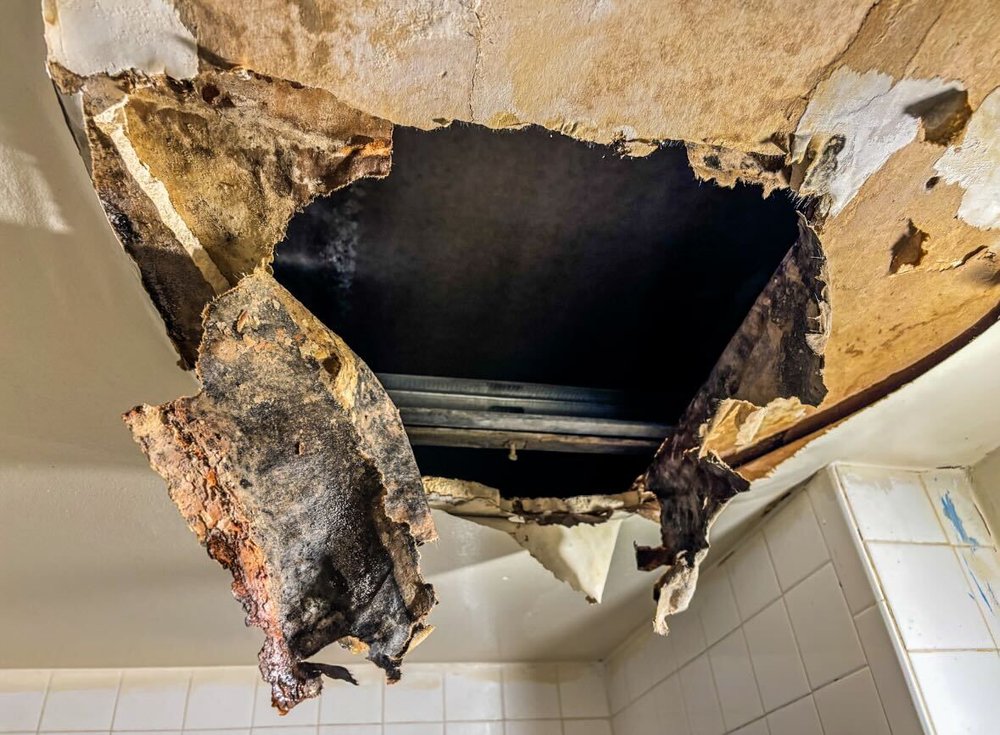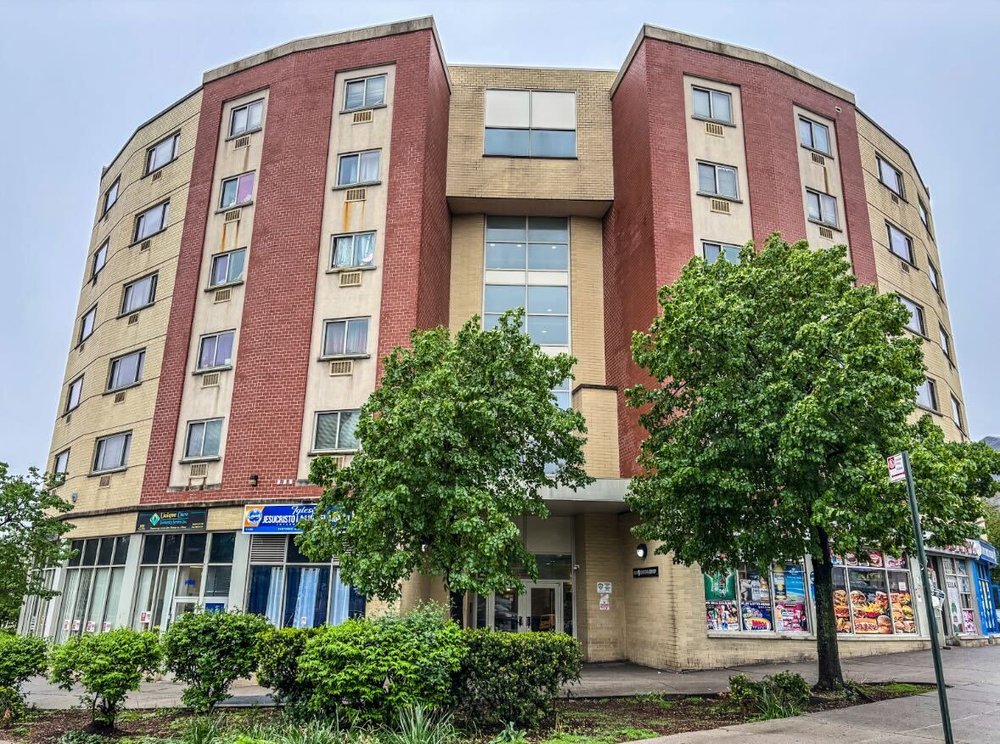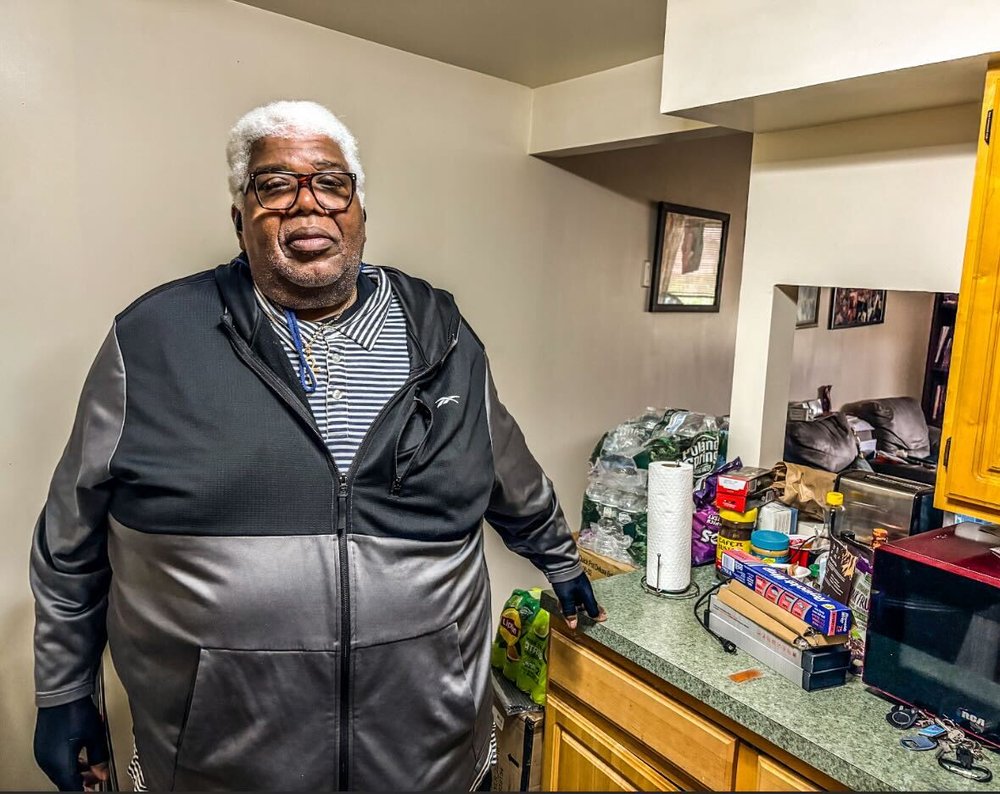Real estate execs gave $400K to Cuomo’s PAC. NYC is suing them for building disrepair.
May 8, 2025, 6:30 a.m.
The city has sued the donors over conditions in at least 20 of their buildings over the past year.

Fix the City? How about just fixing your buildings, tenants and their advocates say.
The political action committee backing Andrew Cuomo’s bid for mayor — dubbed “Fix the City” — has collected at least $410,000 from real estate executives and companies currently being sued by the city that Cuomo hopes to lead, according to a Gothamist review of court records. All of the lawsuits against the landlords were filed by the city’s Department of Housing Preservation and Development over their alleged failure to correct dangerous conditions in apartment buildings they own or manage.
The list of Cuomo contributors hit with lawsuits includes two six-figure spenders: Peter Fine, a developer who furnished the former governor’s PAC with $250,000; and A&E Real Estate Executive Chair Douglas Eisenberg, who gave $125,000. The city’s housing agency has sued Fine 16 times over violations in his companies’ buildings in the past year and has named Eisenberg in four ongoing lawsuits over dangerous conditions in his company’s Queens complexes.
HPD spokesperson Natasha Kersey said the agency’s decisions are not influenced by well-connected property owners.
But good government groups and tenant advocates say the contributions raise questions about what the donors hope to gain in exchange for their largesse if Cuomo were elected mayor. That may include a housing agency that’s more lenient when it comes to problems at their properties, they said.
“It's a terrible look,” said Susan Lerner, executive director of the organization Common Cause New York. “It appears to be trying to buy access and influence over a candidate who is reported to be the front-runner.”
Cuomo, one of at least eight Democrats challenging incumbent Mayor Eric Adams, has led every primary poll since announcing his candidacy in March. His spokesperson Rich Azzopardi declined to comment on the contributions to a political action committee barred by law from coordinating with the campaign.

Overall, real estate executives and companies have poured millions into the pro-Cuomo Super PAC, which has reported raising more than $6.2 million as of May 5.
Lerner said the large donations “create cynicism on the part of the voters as the campaign finance system is not protecting their best interests.”
A 2010 Supreme Court decision known as Citizens United v. Federal Election Commission allows outside committees to raise unlimited amounts of money from companies and individuals and use the cash to promote a candidate, as long as they don’t coordinate directly with a campaign. But no laws prohibit candidates from signaling to the PACs when it comes to messaging that could boost their campaigns — something Cuomo has done through his website.
Fix the City spokesperson Liz Benjamin shot back at the criticism, saying the committee “is an independent organization that, along with our donors, knows that Andrew Cuomo has a successful history of developing affordable housing and championing the rights of tenants at the city, state and federal levels.”
“Baseless allegations aside, our donors support Fix the City because they know that this is the moment for experience and competence, for a mayor who will work for all New Yorkers, and that’s Andrew Cuomo,” she added in a written statement.
Cuomo has touted his housing achievements as governor, including financing tens of thousands of new units of affordable and supportive housing statewide and expanding tenant protections. But he has also faced pointed criticism for presiding over a sharp rise in homelessness and a growing affordability crisis.
Tenants living in buildings owned by Cuomo’s contributors who are being sued by the city say they need a mayor who won’t be beholden to landlords.
‘It’s getting worse’
Dejohn Kornegay, 30, lives in a 95-unit building on Boston Road in the Bronx where conditions prompted city attorneys to sue the landlord for repairs last month. It’s the most recent lawsuit filed by HPD that names Fine and a limited liability company tied to his firm, Atlantic Development Group.
Kornegay said he pays $2,500 a month for the unit, where a 2-foot-wide hole gapes above the bathroom sink. He said the ceiling collapsed while he was brushing his teeth and fell on his head two months ago.
“ I've been just living with this situation, and I'm still trying to tell them to come fix it and they still haven't come fix it,” Kornegay told Gothamist inside the bathroom on Tuesday.
He said he was excited to move into the unit eight years ago after living in the Highbridge section of the Bronx, but his excitement quickly faded.
“There's mold everywhere. They're not fixing anything or doing anything,” he said. “It’s getting worse.”

His neighbor Harold Wright, a 64-year-old retired substance abuse counselor, said he moved into his top-floor unit in 2007
“ When I moved in this building, we were being featured on [the news] as one of the highlights of the Bronx,” Wright said.
But that soon changed, he said. After five years, he said, he began dealing with chronic heat and hot water outages.
“ There's no accountability,” he said. “This ownership is not accountable for nothing.”
The building currently has 140 open housing code violations, including 50 deemed “immediately hazardous,” according to city data.
‘One thing has nothing to do with the other’
Fine did not respond to calls and emails about conditions in his buildings.
But he has a history of appealing to politicians through campaign contributions and favors.
In 2011, the city’s Department of Investigation found he connected then-Bronx Borough President Adolfo Carrión with an architect who provided free renovations at Carrión’s home five years earlier. At the time, the architect was working on an affordable housing development owned by Fine’s Atlantic Development Group — a project that benefited from Carrión’s official approval and assistance reaching city agencies, the Daily News reported. That development, Boricua Village, is among the buildings that HPD sued Fine over after inspectors documented multiple heat and hot water outages last fall.
After the investigation, the city’s Conflict of Interest Board fined Carrión $10,000 for not disclosing the relationship with the architect. HPD later banned Fine from participating in its affordable housing programs after one of his companies pleaded guilty to tax fraud, the news site The City reported.
Fine’s former business partner Marc Altheim, who is named in two lawsuits from the housing agency, also gave $10,000 to Cuomo’s SuperPAC in March. Altheim did not respond to requests for comment.
Another contributor being sued by the city told Gothamist he isn’t funding “Fix the City” because he hopes a Mayor Cuomo would drop the lawsuits or shield his company from future litigation.
"One thing has nothing to do with the other,” said A&E Real Estate’s Eisenberg in a written statement sent to Gothamist. “I’ve supported candidates going back to David Dinkins because I thought they represented the kind of smart leadership we need in this city.”
“I don’t do it because I expect any kind of special treatment,” he added. “We invest in maintaining and improving our buildings no matter who is mayor, and we fully expect our recent issue with HPD to be resolved this year.”
A&E, one of the city’s biggest landlords, has repeatedly faced scrutiny over conditions at its buildings, as well as accusations that it illegally raised rents and attempted to drive tenants out of regulated apartments to increase rents before new laws curbed those practices in 2019. As governor, Cuomo signed those measures into law but now says they had “unintended consequences” that inhibit owners’ ability to raise rent after making repairs.
The number of housing code violations across New York City has risen by nearly 23% over the past two years, according to annual data released by the mayor’s office. Landlords and their representatives have blamed the package of 2019 laws for reducing their potential income and forcing them to cut back on repairs and maintenance. At the same time, landlord costs, like insurance and labor, are also rising. About 9% of buildings containing at least one rent-stabilized apartment are facing financial distress, meaning the landlord’s debts and expenses are higher than their revenue, according to data compiled by the city’s Rent Guidelines Board.
But supporters of the rent reforms, including tenant advocates, counter that many landlords simply made a bad bet by taking out hefty loans that they could only repay by raising rents. That once-lucrative strategy backfired when the state tightened restrictions on rent increases, they say.
“Rent-stabilized buyers were, for a long time, willing to pay much more for their buildings than the rent rolls commanded because they and their banks assumed they could engineer ever-rising rents,” housing policy analyst Sam Stein, of the nonprofit Community Service Society, told members of the Rent Guidelines Board last month. “Some landlords now find themselves operating at a loss and confronted with the option of selling less than the purchase price or paying their banks and neglecting their buildings.”
A&E is now facing foreclosure on a portfolio of 31 properties after it defaulted on its mortgage and its lender sued for the full balance in January. Eisenberg said the company has continued making loan payments and is “confident this will be resolved in short order.”
“This does not affect the operations of our properties, and we continue to maintain the highest standards for our residents,” he said.
Trouble in Queens
Last week, Gothamist visited one of the four Queens buildings subject to a city lawsuit against Eisenberg and A&E on 34th Street in Astoria. Inside the bathroom of one apartment, water dripped from a hole in the swollen ceiling. A waterlogged wall in the same bathroom squished when pressed. Tenants in the apartment said they did not want to be named in a story out of fear of retaliation from the management company.
The building now has 78 open violations, according to city records — including mold blooms, roach infestations and broken floors. That’s down from 410 when the city first sued A&E and Eisenberg last August. A notice posted in the building’s lobby indicates the property entered the city’s Alternate Enforcement Program in March, subjecting the owner to increased monitoring and penalties for failing to complete necessary repairs.
The four Queens buildings owned by A&E accounted for a total of 1,578 open violations when HPD sued in August, according to the lawsuits. That number is down to 506 as of May 5, according to a review of building data on the agency’s website.
Despite the improvements, city attorney Bryan Daly wrote in a letter to A&E’s lawyer in February that “A&E’s conduct puts tenants at risk, puts our agency in an extremely difficult position and increases costs for New York City taxpayers.”
The company’s attorneys countered that A&E is addressing the violations and complying with the terms of the city’s enforcement program. They have asked a judge to remove Eisenberg from the lawsuits.
Previously, Eisenberg tried to go through backchannels to negotiate with city officials, including Carrión, who was then serving as the city’s housing commissioner, according to emails entered into the court record. HPD’s head of litigation rebuffed the negotiation attempt, the emails show.
‘It’s gross’
Cuomo has also received support from Progressive Management, another company the city sued last month. In this case, a housing inspector found the heat wasn’t working at a 36-unit apartment building the company runs in Bedford Stuyvesant and could not access the building boiler. The company did not respond to requests for comment.
Less than three weeks after the lawsuit was filed, Progressive Management gave $25,000 to “Fix the City.”
Tenant organizers say they worry the political contributions could undermine their own efforts to achieve safer housing.
“Big real estate is taking advantage of these tenants and they’re trying to game the system yet again,” said Gabriel Flores, an organizer with the nonprofit Goddard Riverside. “I think it’s gross.”
Housing could be on the ballot in NYC. Here’s what New Yorkers may be voting on. Locked out of NYC, Airbnb is now single largest spender in local elections